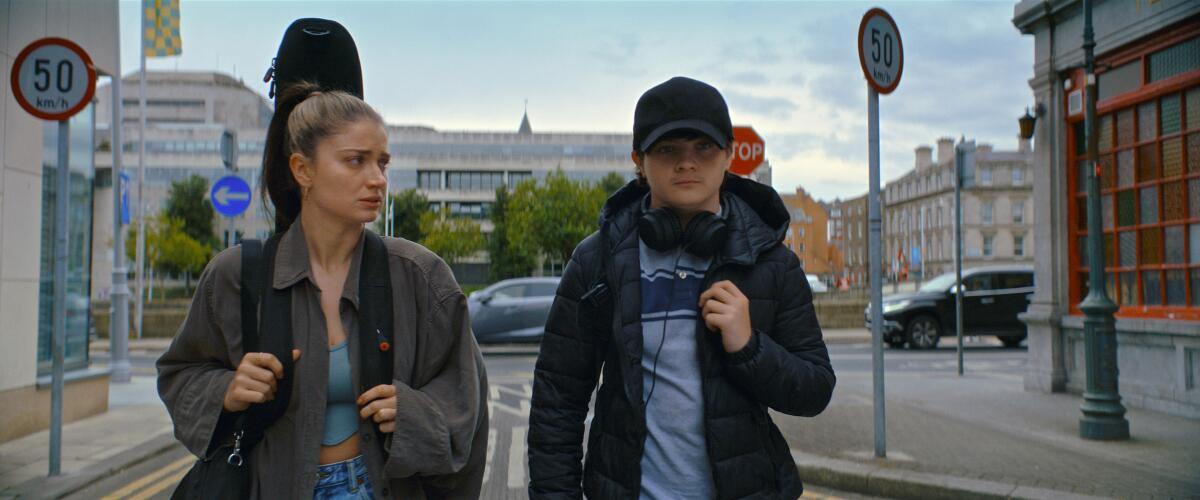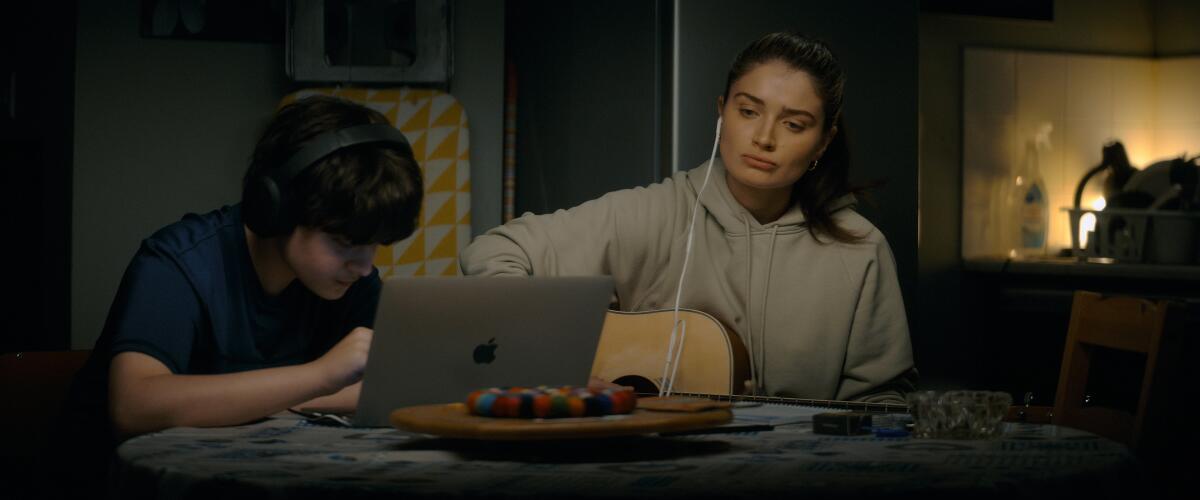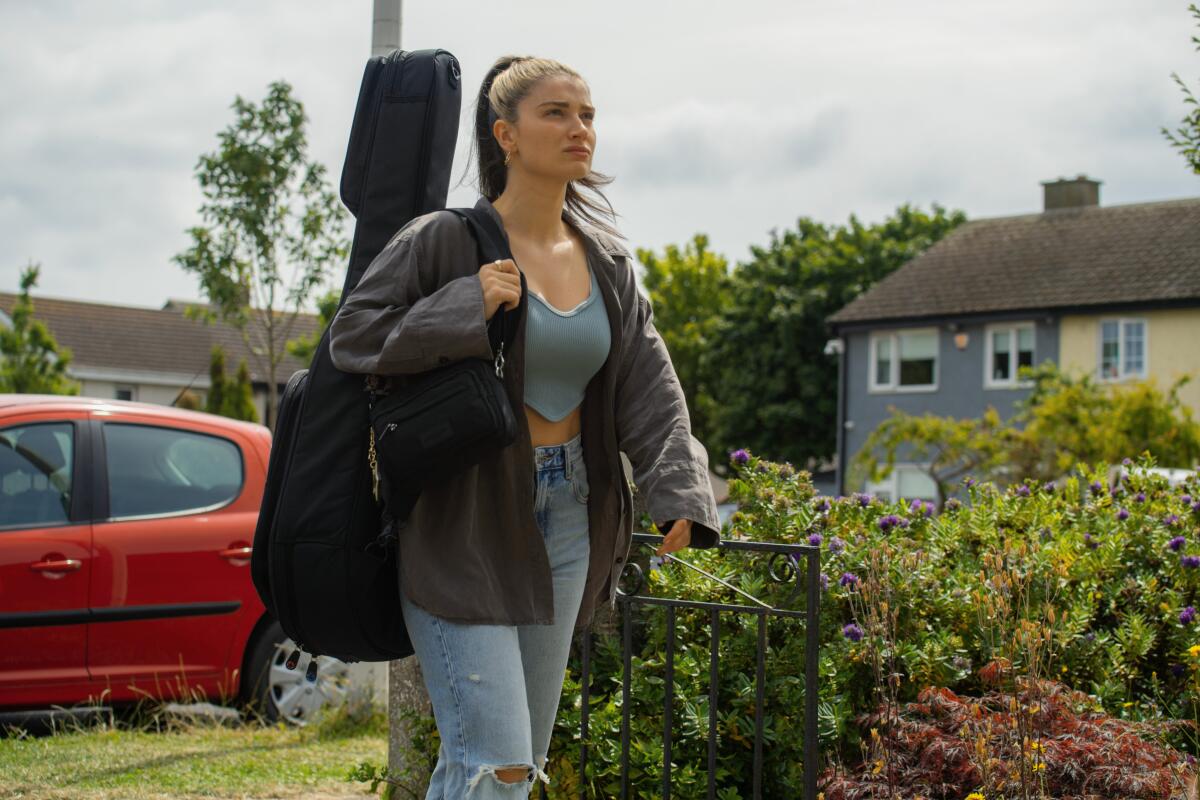Over the years, John Carney has found many treasures in the dumpsters of Dublin, among them the idea that would inspire his new film, “Flora and Son.”
After fishing out a guitar amplifier that, to his surprise, worked fine, he imagined the neck of a guitar sticking out of the rubbish like Excalibur. Who would pull it out? Carney’s mind began tripping across the ideas that would become a story of a single mother connecting with her delinquent son though music.
Having premiered earlier this year at the Sundance Film Festival, “Flora and Son” opens in theaters this week before launching on Apple TV+ on Sept. 29. The picture continues Carney’s series of music-themed films he has specialized in since 2007’s “Once,” a romance about two struggling musicians that won an Oscar for the song “Falling Slowly.” Since then, Carney has also made 2013’s “Begin Again,” starring Keira Knightley and Mark Ruffalo and set in the New York City record industry, and 2016’s “Sing Street,” about Dublin teens forming a band in the 1980s.
In “Flora and Son,” the title character (Eve Hewson of “Bad Sisters”) gifts that dumpster guitar to her troubled kid, Max (Orén Kinlan), but he doesn’t want it, as he’s more interested in making hip-hop on his laptop. So she begins taking guitar lessons herself, from an online teacher, Jeff (Joseph Gordon-Levitt), based in Los Angeles. Eventually, Flora and Max find a way to connect across their disparate musical tastes.
When the movie played the recent Toronto International Film Festival, Carney brought out a guitar during his post-screening Q&A and with his co-songwriter Gary Clark, induced the audience into a sing-along of “Meet in the Middle,” one of the tunes written during the course of the picture’s plot.
Sitting for an interview during the festival, Carney explained that one of his goals for the movie was that it remain a modest, human-scaled story about attainable, everyday goals.
“I really didn’t want to make ‘Flora from the flats finds a guitar and ends up conquering the world with her amazing music,’ ” said the director. “I just wanted to make a story that was plausible and realistic. I’d love it to be marketed in that way as well, so it doesn’t seem like we’re overselling: This movie’s going to change your life.”

Eve Hewson and Orén Kinlan in the movie “Flora and Son.”
(Apple TV+)
There’s something really funny and exciting that the title is almost like a spoiler. For a lot of the movie, it seems like it’s about to become this romance between Flora and her guitar teacher, and then it turns out the most important relationship really is between Flora and her son.
At the beginning of this process, I was like, ‘Can I get away with another light musical with people singing and falling in love?’ And then I was like, maybe they’re not falling in love. Can I bring that sense of possibility and collaboration to a more grown-up, nonromantic story? Because boy meets girl, whether it’s on Zoom or whether it’s Glen and Marketa [of “Once”] in Dublin, or Mark Ruffalo and Keira Knightley, boy meets girl is pretty straightforward. And I feel like as a filmmaker, I need to push myself a little bit further, but I do like working in that musical sort of whimsy.
Do you consider these movies musicals?
This movie, I don’t think, really is a musical, actually. They’re musically dense movies, and I certainly think “Sing Street” was a musical and “Once” in the beginning, but I don’t know if this so much is. I’m a bit tired of the narrative of music films at the moment. All you’ve got to do is believe and dream, and then you’ll have a hit record. And I probably propagated that myth a little bit myself, but I don’t know if I really believe it. Music is so much more interesting than just trying to have a hit record or make it. The tropes of the unlikely scruffy underdogs making it big is the traditional kind of musical story: Follow your dream and everything will be resolved. I’m a bit tired of that.
This film in particular explores the process of creating music and the connection it creates between people. How did you come to that?
I think that the most beautiful thing about music is not where it goes in the end, but the process of the creativity. And we don’t really give enough credit to the doing of it. We’re so much about the result and about the success or failure of the result. And having kids now — in the last seven years, I’ve got two kids — which made me really remember through my son, through watching him create things, just how much fun creating something was. My son will do something, and he’s actually not that interested in the end of it and the results. It’s the process of doing it that was the fun part. And then he throws them away. So it’s not that you write the most amazing song ever and release an album and win a ton of awards. It’s the process of doing it.
Thinking about it now, I think the process in Ireland in the ’70s and ’80s was a challenge because we didn’t have the facilities. And we weren’t resourced. Not everybody had a guitar. And nobody had a facility for recording a guitar. There was nothing. And filmically, like, one guy had a camcorder. That’s it. The school has a camcorder that you can maybe borrow for half an hour one day. That’s it. And I found the challenge of just getting something in the can, whether it was music or film, was itself so much fun. And so much more like a Huck Finn sort of adventure story in and of itself. It wasn’t about the end result. And I guess that’s why I bang on about these things in these movies.

Orén Kinlan and Eve Hewson in the movie “Flora and Son.”
(Apple TV+)
Max is making bedroom hip-hop that’s distinctly different from the music in your other films. Was it important to you that this movie be about a younger generation?
Yes. In these little films that I do, a very important leg of the table is: What is the sound here? Once I’ve decided loosely on a story in a world of the characters, how is this movie going to sound? And “Once” was folksy, “Begin Again” was singer-songwriter pop, “Sing Street” spoke for itself — it’s ’80s parody music. And they were very clear from the very beginnings of those movies what they should sound like. You have a guy who’s busking and you know how he’s going to sound. “Flora” was a puzzle because I had 50 pages of the script and I didn’t really know what this was going to sound like.
What’s the feeling in the room? Is it “Saturday Night Fever” or is it “The Commitments” or is it “Singin’ in the Rain”? And I didn’t want to repeat myself, and I also wanted to make a nice sound, and it had to be a plausible sound that these three characters would create together. And the characters kind of dictated that for me, which is that she’s going to know about 10 chords. Because we’ve seen her just learn guitar. So let’s not have her be like James Taylor all of a sudden or Carole King. So that’s interesting, she’s limited. The character of Jeff is a failed L.A. songwriter, a troubadour that didn’t make it. Songs probably aren’t great, but he probably has good taste and he can play well.
And the kid is working with GarageBand and just what came on this laptop that he got. So he’s probably doing goofy experimental stuff with loops. But how can I make those three things connect in a sonic way that’s actually appealing? Because I don’t want to to make s— music either, even though the likelihood is that they would probably be s—, given the rules of reality. It’s a film, so we’re in a fantastical space where we’re exaggerating things slightly. So I gave myself permission within those limits to make something nice. It’s not going to be 50 chords and complex lyrics and depth. It’s probably going to be fun. And I limited myself and Gary and other people that helped us with the songs: We’re not going to go to a big recording studio or get an orchestra. We have to make this between that acoustic guitar and the software that comes on GarageBand.
Did you tweak things once you had the cast in place, in particular Eve Hewson?
I had met her a couple of times with her dad [U2’s Bono], and she was on my radar in terms of she’s an up-and-coming actor. But I never had anything to send her work-wise until “Flora” came along and her agent rang me and said, “Did you ever think of Eve for this role?” And I was like, no, I never thought of her for that. I thought she was very refined-looking, and I think I saw her in some TV show or a film where she was wearing a Victorian sort of dress with a high collar and she looked very elegant and poised. I was like, that’s not going to work for this salty Dublin screaming-screeching wino woman that I’m writing about. But I Zoomed with her and she was like, “No, I’m that screeching wino woman, trust me. I’ve hung around Dublin all my life, and I’ve seen Flora, I know her. I know what this character sounds like, and I know what her problem is and her troubles are.”
She just struck me as somebody who was going to jump into this role and make it her own, and not just satisfy this 50-year-old Irish filmmaker. This film didn’t need an actor who would politely do the performance and move on to the next gig. It needed somebody that would come in and choke the hell out of this character. And not stop until she got it. A lot of actors I know very politely say, “Are you happy? Should we move on?” And Eve’s not like that. She’s like, “I’m not happy. And what’s the point in moving on with a half-ass scene?” And I’m like, I love this person. This is exactly the spirit in which this movie should be made.

Eve Hewson in the movie “Flora and Son.”
(Apple TV+)
Did you know that she hadn’t really sung before? Given her father, it’s natural to assume that she had.
I know. She didn’t consider herself a singer, and she said that from the word go, but I was like, it doesn’t matter. I’ve seen that scene so many times, like, ”Who’s that singing? Why, it’s the working-class girl from the flats. She sings like an angel.” I just am tired of the story of great geniuses if only the world let them be amazing.
So this was not about what a great voice God has blessed this child with. It’s about trying, giving it a shot — and she’s got something to say, but it’s not particularly coherent. And the song that she does at the end isn’t a slam-dunk female empowerment ballad or something. It’s a mother singing awkwardly to her son, and it’s a mess, but it’s a beautiful mess. And Eve really got that. If Eve could sing like her dad, I would’ve probably said don’t.





